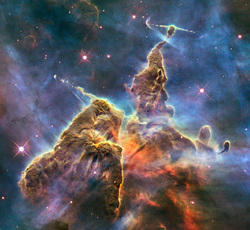Astrophotograpy

My main area of interest has traditionally been in visual astronomy. When I first started my hobby in the mid-90's, the primary form of amateur astro-imaging was traditional film. CCD cameras of that era had very small chips and could really only effectively capture monochrome images. Those that were more advanced were way out of my price range. I figured I could look at as many pretty Hubble pictures as I wanted online and didn't have any great desire to try and capture those with film because there was simply too much trial-and-error involved to have to wait and see the result after processing the film. In essence, I didn't feel the investment of time and money was worth the return. There is also something special about actually looking at the night sky, nebulae, galaxies, planets, and star clusters with your own eyes that somehow transforms life and existence into a more balanced perspective. For me, it's relaxing and provides an escape from the mundane routine of life.
Enter the 21st century. CCD cameras have come down in price dramatically and increased in capability by many orders of magnitude. It is now within the reach of amateur astronomers to do real science in the areas of spectroscopy, planetary and deep sky imaging, supernova and astroid identification, and sometimes just stumbling across a rare comet. For these reasons, and the fact that I'm always looking for a new challenge and opportunity to learn something new, I decided to take the plunge into astrophotography. I'm just getting started and I'm not very good at it (yet), but with a lot of study, practice, and some clear skies, I hope to improve my skills.
I do both planetary and deep sky astrophotography. I welcome any and all feedback.
Enter the 21st century. CCD cameras have come down in price dramatically and increased in capability by many orders of magnitude. It is now within the reach of amateur astronomers to do real science in the areas of spectroscopy, planetary and deep sky imaging, supernova and astroid identification, and sometimes just stumbling across a rare comet. For these reasons, and the fact that I'm always looking for a new challenge and opportunity to learn something new, I decided to take the plunge into astrophotography. I'm just getting started and I'm not very good at it (yet), but with a lot of study, practice, and some clear skies, I hope to improve my skills.
I do both planetary and deep sky astrophotography. I welcome any and all feedback.